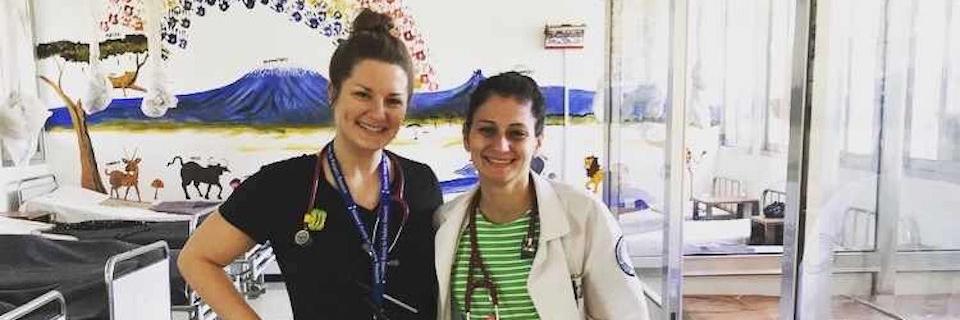Trip to Tanzania Provides New Perspective for Alumna Med Student

It took years for Jenny Buehler, ’11, to learn the routines that medical professionals in the United States use every day to care for patients.
But on a recent trip halfway around the globe, Buehler said she learned quickly that medical care for so many others is anything but routine.
Buehler will finish her pediatrics residency at Cardinal Glennon Children’s Hospital in St. Louis, part of her medical school at Saint Louis University, at the end of June. Earlier this year, she took part in a trip to Arusha, Tanzania, through the school’s Medicine Abroad Program. She said her group worked in a government-run hospital in the east African nation, providing care to local residents for all kinds of ailments.
“I knew I wanted to experience a different culture and see how health care systems worked in different areas of the world,” Buehler said. “Previous residents had traveled to different areas of eastern Africa and thoroughly enjoyed their experiences, so I figured I'd give it a shot.”
Helping others through medicine has been a longtime dream. Buehler said she remembers growing up in St. Louis and touring different high schools, and remembered specifically visiting the anatomy lab at St. Joseph’s Academy when she was in seventh grade.
“I thought this was one of the most fascinating things, and realized that I wanted to continue studying the field of science and anatomy,” she said, “After high school, I received a full scholarship to Rockhurst and qualified for the pre-med scholars. I was pretty sure medicine was the field I wanted to practice in, but shadowed a few doctors just to make sure.”
The trip to Tanzania earlier this year was in that same spirit of exploration. Buehler said it gave her a new perspectives on how medicine is practiced in one part of the globe — a place where resources are not necessarily as plentiful as what she was used to.
“The things myself and fellow physicians make routine use of, such as oxygen or intravenous fluids, are only sparsely available in developing countries. It truly makes you step back and contemplate if all your medical interventions are necessary,” she said.
Buehler said the local residents expressed appreciation for the assistance that herself and the rest of the team were able to offer. And in some cases, she said the care they gave made for extremely emotional experiences.
“One of my favorite things in the hospital was to see a little 5-year-old girl as she was recovering from a serious brain inflammatory condition,” she said. “It was uplifting to see that first smile on her face and moments of happiness with her mother, after she had been in a comatose state for quite a few days.”







